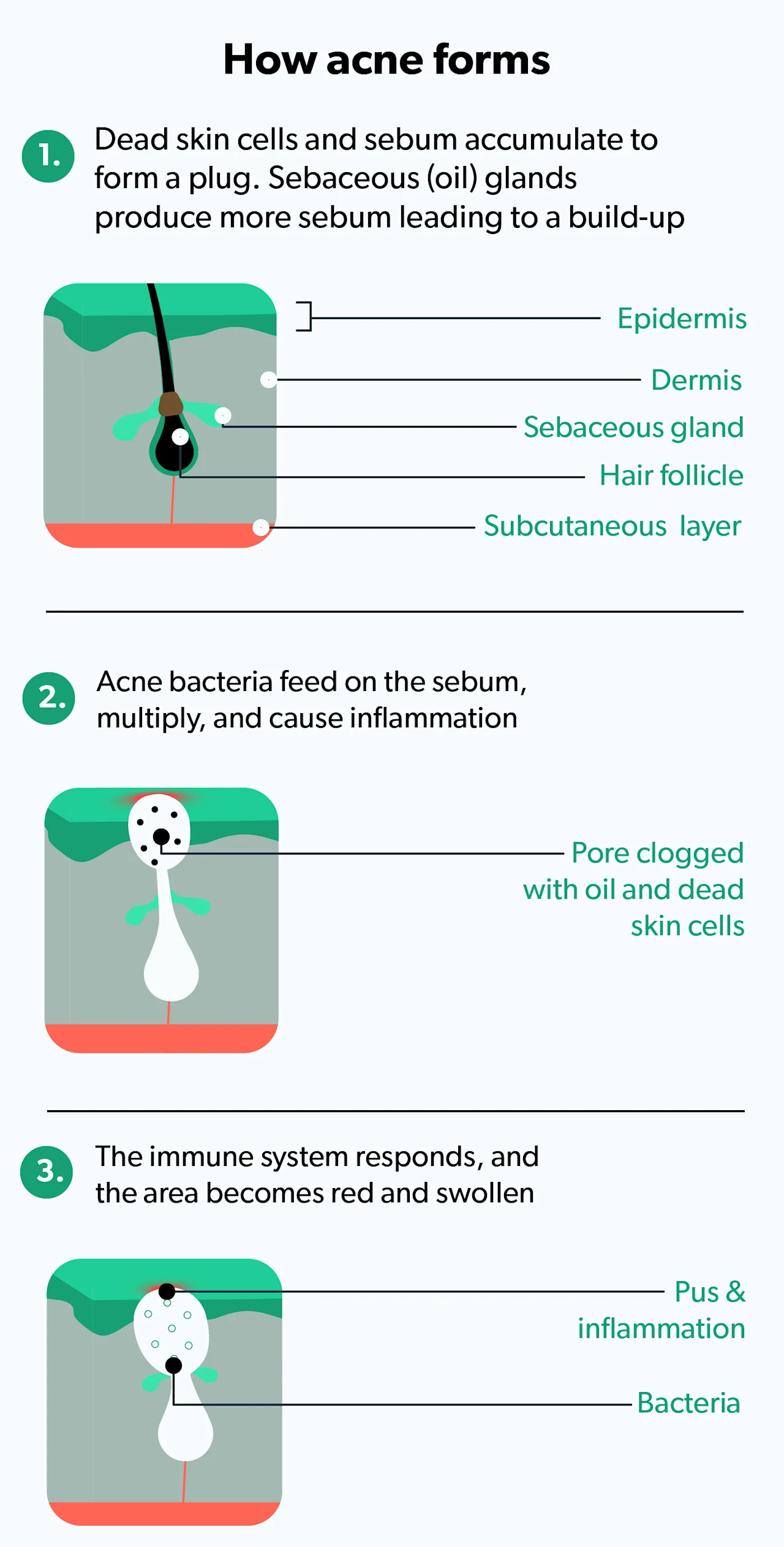Here's what we'll cover
Here's what we'll cover
If you're suffering from acne, you know how much it can impact your life. Regular breakouts can cause a serious dip in your self-confidence, especially if you have a hard time covering them up. If topical treatments just aren't working for you, your dermatologist might suggest using doxycycline for acne.
Not many people are familiar with this pill, as its use as a treatment for acne has changed drastically over the past few years. But if you're curious about doxycycline, you're in the right place. Let's break down exactly how this pill works and whether it might be good for you.
What is doxycycline?
Doxycycline is a prescription antibiotic and a member of the tetracycline class of drugs. Like most oral antibiotics, it was not created to treat acne but rather bacterial and parasitic infections (Patel, 2021).
Studies show that doxycycline has anti-inflammatory properties, making it a useful tool in inflammation-related conditions. Doxycycline hyclate is a generic medication, but you may also find it under brand names like Doryx, Vibramycin, Oracea, Adoxa, and others (Patel, 2021).
What is doxycycline used for?
Doxycycline is an effective tool for treating and managing skin, dental, respiratory, and urinary tract infections, like (Patel, 2021):
Methicillin-resistant Staphylococcus aureus, or MRSA
Skin infections
Tick-borne illnesses, like Lyme disease
Malaria (both to prevent infection and treatment)
Sexually transmitted infections (i.e., syphilis, chlamydia, gonorrhea, pelvic inflammatory disease)
Infectious outbreaks, like typhus and cholera
Periodontal disease (gum disease)
The anti-inflammatory properties of doxycycline make it helpful in treating inflammatory conditions, including (Patel, 2021):
Moderate to severe acne vulgaris: clogged pores lead to inflammation and appearance of “zits”
Rosacea: autoimmune skin disease that causes flushing and rashes on the face
Bullous dermatoses: autoimmune skin diseases that cause fluid-filled blisters
Granulomatous diseases: autoimmune skin diseases that cause rashes
Livedo vasculitis: inflammation and blood clots in the legs and feet
How does doxycycline work for acne?
Acne happens when skin oils (sebum) and dead skin cells clog your pores. Sometimes, these clogged pores attract bacteria and inflammation, leading to the red, irritated, pus-filled breakouts we all recognize.

Using doxycycline for acne works because the drug has two effects: antimicrobial and anti-inflammatory properties.
It stops bacteria by getting into the microbe’s cells and halting the protein manufacturing process, killing the cells. Doxycycline is especially suited for acne treatment because it likes oily environments (like clogged pores), which happen to be where skin bacteria (C. acnes) thrive. These bacteria are a normal part of skin flora, but when they get into a clogged pore, they wreak havoc on your skin. Doxycycline helps control them (Baldwin, 2020).
But that’s not the only way doxycycline works for acne and other immune-related medical conditions—it also helps decrease inflammation. Its anti-inflammatory effect comes from its ability to dampen inflammatory chemical pathways. By combining its antibiotic and anti-inflammatory effects, doxycycline can effectively treat inflammatory acne (Baldwin, 2020).
Side effects of using doxycycline for acne
While doxycycline is considered generally safe, it does come with potential side effects, including (Patel, 2021):
Upset stomach
Diarrhea
Photosensitivity (skin more prone to sunburns)
Nausea
Vomiting
Skin rash
Headaches
Heartburn
Esophagitis (inflammation of the esophagus)
When taking doxycycline, you should always wear sunscreen with an SPF of 50+ and reapply it throughout the day. Avoid taking doxycycline on an empty stomach to help prevent nausea and other adverse effects. Try not to lie down for at least 30 minutes after taking doxycycline to help prevent heartburn.
Doxycycline warnings
Certain people should avoid doxycycline, including (Patel, 2021; Baldwin, 2020):
People who are pregnant or breastfeeding: Doxycycline can harm a developing fetus and cause permanent tooth discoloration. Because of this, your dermatologist may suggest using birth control to avoid pregnancy during your cycle of doxycycline.
Children under eight years old: Doxycycline can affect bone growth and cause permanent yellowing of teeth.
People allergic to tetracyclines: Doxycycline is a kind of tetracycline antibiotic. Other examples include tetracycline and minocycline.
If you have any concerns about doxycycline, it’s a good idea to talk to your doctor. If it winds up that this antibiotic isn’t a good option for you, never fear—other antibiotics can also help to clear up your acne.
Doxycycline dosage for acne
Your doxycycline dosage will depend on what condition your provider is trying to treat. The dose for treating a bacterial infection will likely be higher than that used to help acne.
Because of the growing concern of antibiotic resistance and overuse, dermatologists tend to prescribe doxycycline for no more than three months and combine it with other acne treatments, like topical retinoids and over-the-counter benzoyl peroxide (Zaenglein, 2018).
Doxycycline doses used in the treatment of acne typically range from 40 mg to 100 mg daily. Interestingly, research suggests that the 40 mg dose is more effective at improving moderate acne than the higher doses (Baldwin, 2020).
Doxycycline interactions
Drugs that are safe on their own may have serious drug interactions—be sure to let your healthcare provider know about any other medication you are taking before starting doxycycline.
Medications that may interact with doxycycline include (DailyMed, 2019):
Oral retinoids like isotretinoin (brand name Accutane): this combination increases your risk of intracranial hypertension (a buildup of pressure around the brain); topical retinoids are a safer choice
Blood thinners: doxycycline may decrease your blood’s ability to clot naturally; if you are taking blood thinners, your dose will need to be adjusted
Oral contraceptives: doxycycline may decrease the effectiveness of some birth control pills, and you may need to use a second form of birth control while taking this antibiotic.
Doxycycline and alcohol
Drinking alcohol should always be done in moderation. You can drink alcohol while taking doxycycline. However, people with chronic alcoholism may need an increased dose of doxycycline for it to be effective (Mergenhagen, 2019).
Acne medications, like oral doxycycline, can help clear up your stubborn pimples, which can help you feel more confident. If you think that this medication may be right for you, make an appointment with your dermatologist or healthcare provider to discuss all of your options.
DISCLAIMER
If you have any medical questions or concerns, please talk to your healthcare provider. The articles on Health Guide are underpinned by peer-reviewed research and information drawn from medical societies and governmental agencies. However, they are not a substitute for professional medical advice, diagnosis, or treatment.
Baldwin, H. (2020). Oral antibiotic treatment options for acne vulgaris. The Journal of Clinical and Aesthetic Dermatology , 13 (9), 26–32. Retrieved from https://www.ncbi.nlm.nih.gov/pmc/articles/PMC7577330/
Corrà, A., Quintarelli, L., Verdelli, A., Portelli, F., Massi, D., & Caproni, M. (2020). Granulomatous dermatitis and systemic disease: an association to consider. BioMed Research International , 2020, 3281380. doi: 10.1155/2020/3281380. Retrieved from https://pubmed.ncbi.nlm.nih.gov/33062676/
DailyMed. (2019). Doxycycline capsule . Retrieved on Oct 27, 2021 from https://dailymed.nlm.nih.gov/dailymed/drugInfo.cfm?setid=22b7035c-6874-4cf4-ad73-06a105bffc64
Mergenhagen, K. A., Wattengel, B. A., Skelly, M. K., Clark, C. M., & Russo, T. A. (2020). Fact versus fiction: a review of the evidence behind alcohol and antibiotic interactions. Antimicrobial Agents and Chemotherapy , 64 (3), e02167-19. doi: 10.1128/AAC.02167-19 Retrieved from https://www.ncbi.nlm.nih.gov/pmc/articles/PMC7038249/
Patel, R. S, Parmar, M. (2021). Doxycycline hyclate . [Updated Aug 10, 2021]. In: StatPearls [Internet]. Retrieved on Oct 27, 2021 from https://www.ncbi.nlm.nih.gov/books/NBK555888/ .
Zaenglein, A. L. (2018). Acne Vulgaris. The New England Journal of Medicine , 379 (14), 1343–1352. doi: 10.1056/NEJMcp1702493. Retrieved from https://pubmed.ncbi.nlm.nih.gov/30281982/ .










